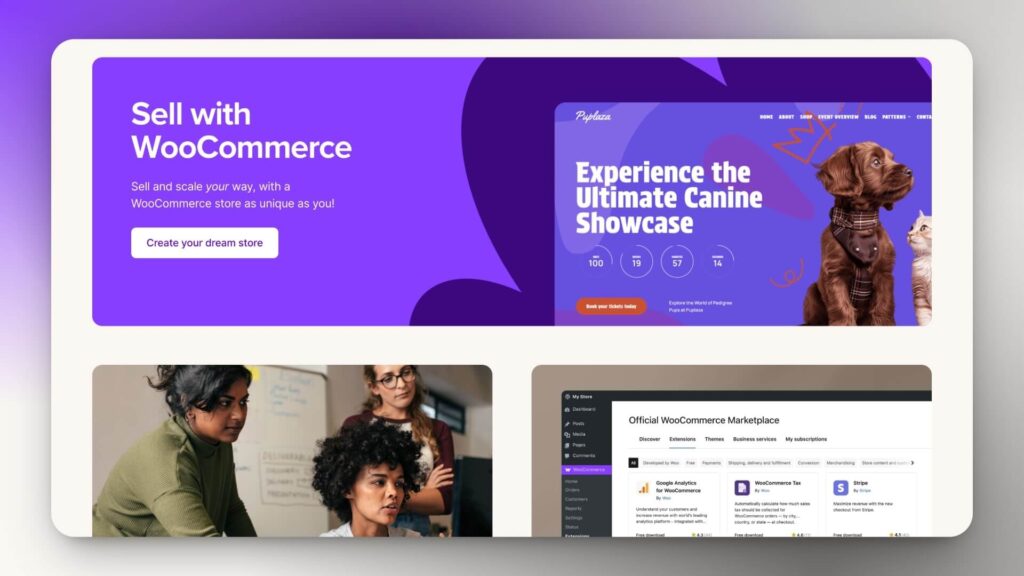Ranking of the 9 best eCommerce platforms

The first step in creating your online store is choosing the e-commerce platform on which it will operate.
For this purpose, we have researched and listed the 11 best E-commerce platforms, ranging from small businesses to medium-sized businesses, based on our experience.
This choice is based on many factors: ease of use, price, functionalities, design options, integrations, maintenance, SEO optimization, and loading speed.
Each E-Commerce platform is different and focuses on a specific market niche. It has its pros and cons, and depends on the type of business and its stage.
The best eCommerce platforms in 2025
First, we will review and compare the features, pros, and cons of the top ecommerce platforms for small and medium-sized businesses, providing you with a quick resource for informed decision-making.
1. Wix eCommerce
Best e-commerce platform for small businesses

Wix eCommerce is an all-in-one online store builder that has nothing to envy its direct competitors, such as Squarespace and Shopify. Whether you want to create a website or if you need to set up an online store, Wix has you covered.
Wix offers over 100 mobile-friendly eCommerce templates in its template store, which you can edit using the Wix editor and AI tools.
According to Google Trends, Wix is the most searched website builder in the United States and has more than 100 million users worldwide.
On the other hand, Wix is constantly adding new features, such as review systems, selling print-on-demand products, or offering subscriptions, so that you can continuously improve your online store.
When comparing Wix and Squarespace, both platforms offer eCommerce features to complement their website-building elements. However, Wix has a more extensive marketplace app than Squarespace Commerce.
Pros
Cons
Wix eCommerce Pricing
Wix offers four premium plans for creating websites and e-commerce stores. The Light plan is suitable for building personal websites, while the other plans are for online stores, as they are the only plans that allow you to accept payments.
Here are the prices of Wix pricing for eCommerce:
- Core ($29/month).
- Business ($39/month).
- Business Elite ($159/month).
📢 Try Wix today and start selling your products online.
2. Shopify
Best eCommerce platform for emerging brands and dropshipping

Shopify is one of the fastest-growing e-commerce platforms in recent years. It serves as an all-in-one solution for startups and emerging brands seeking to launch an online store without relying on external web hosting or incurring maintenance costs.
Everything you need is already integrated into the platform: from hosting and store design to blogging and sales analysis. Once you’ve got the basics set up, it’s easy to scale your online store with Shopify native and third-party apps that add more functionality to the store (email marketing, SEO, product reviews, upsell promotions, etc).
Shopify stands out for its simplicity when it comes to brand styles and product page design, with a selection of Shopify themes developed by Shopify experts.
Pros
Cons
Shopify Pricing
Shopify‘s pricing for each of its plans is fair, but it charges a 2% transaction fee if you use a payment gateway other than Shopify Payments. Some Shopify themes are expensive, and certain apps can also incur additional costs on your monthly bill. However, if you know how to choose wisely, you can have a professional Shopify store without incurring significant costs.
The following are the Shopify pricing rates:
- Shopify Lite Plan – $5/month.
- Basic Plan – $39/month (monthly) or $ 29/month (yearly).
- Shopify Plan – $105/month (monthly) or $79 /month (yearly).
- Advanced Plan – $399/month (monthly) or $299/month (yearly)
👉 Don’t forget to check out our Shopify review (what it is, how it works, and key features).
3. BigCommerce
Popular SaaS eCommerce platform for large and B2B companies
BigCommerce is an excellent open SaaS eCommerce platform that allows companies to develop, customize, and grow their online business.
It is focused on large companies with a high volume of sales and advanced needs (such as international business, both B2C and B2B). However, it also has an Essentials version aimed at smaller or start-up companies.
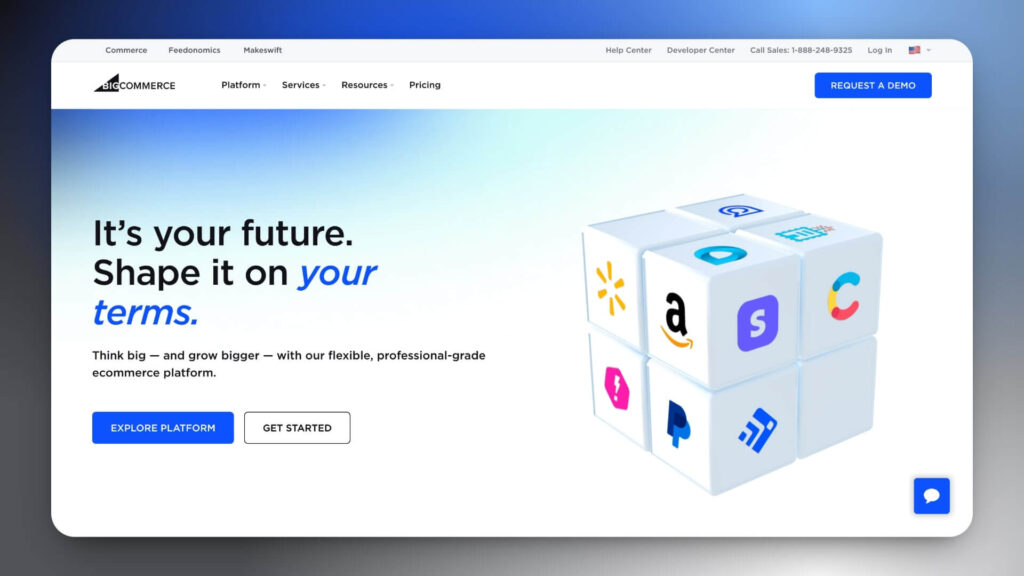
It is a good option for large brands seeking alternatives to PrestaShop or Magento, offering higher performance and functionality, along with hosting and maintenance included.
Thousands of brands in more than 150 countries, including Ford, Toyota, and SkullCandy, as well as Fortune 1000 companies, use BigCommerce and can easily exceed $100 million in annual sales without any issues.
It is a highly customizable platform that enables brands to create tailored online businesses for both B2C and B2B customers.
Its high level of modularity, access to all functionalities via API or headless features, allows you to take full advantage of its advanced back-end while providing total freedom to design custom front-ends or connect with other enterprise systems, such as ERP, PIM, or CMS, including WordPress. It also makes it easy to connect to marketplaces directly or through Feedonomics.
More than 800 apps in the BigCommerce App Store allow you to add numerous additional capabilities to your store, depending on your needs.
Pros
Cons
BigCommerce Pricing
BigCommerce payment plans are based on customers’ online billing, with an Enterprise version available upon request with a customized quote.
For the Essentials version, the prices are:
- Standard ($29/month). Sells up to $50,000.
- Plus ($79/month). Sells up to $180,000.
- Pro ($299/month). Sells up to $400,000.
👉 Don’t forget to check out our guide on what BigCommerce is, its price, and its reviews.
4. WooCommerce
Best eCommerce platform for WordPress (Free + extensions)
WooCommerce is the most popular plugin of choice for WordPress users when creating an E-Commerce store. With over 5 million active installations and a rating of 4.5 out of 5 stars in the WordPress repository, WooCommerce is a free plugin that is compatible with hundreds of themes and additional extensions. In addition, it features the best SEO tools.
With this plugin, you can create categories, subcategories, and attributes for your product catalog. In addition, you can manage your store using sales reports, order reports, and analytical data through integration with Google Analytics.
Pros
Cons
WooCommerce Pricing
Although the use of the WooCommerce plugin is unrestricted, the cost of using WooCommerce templates, hosting, or extensions can amount to a total of $ 350/year, a similar price to e-commerce platforms such as Shopify or BigCommerce.
👉 You can find more information in our WooCommerce pricing analysis.
5. Shopify Plus
Best e-commerce platform for international brands

Shopify Plus is an enhanced version of Shopify’s basic platform, designed for enterprise-level businesses primarily focused on the United States and Europe. It is one of the best Ecommerce platforms for businesses, thanks to its ability to simplify complex technology while allowing you to handle product lines of up to 100 variants across multiple channels.
It offers higher levels of web development and management systems, as well as all the automation tools needed to scale a brand internationally. You won’t have to worry about order quantity either, as this plan accommodates any order volume adequately.
Pros
Cons
Shopify Plus Pricing
The monthly fee for the high-volume business solution includes your main online store and up to 9 expansion stores. The monthly payment starts at $2,300.
6. LogiCommerce
Best Headless eCommerce platform for B2B and B2C
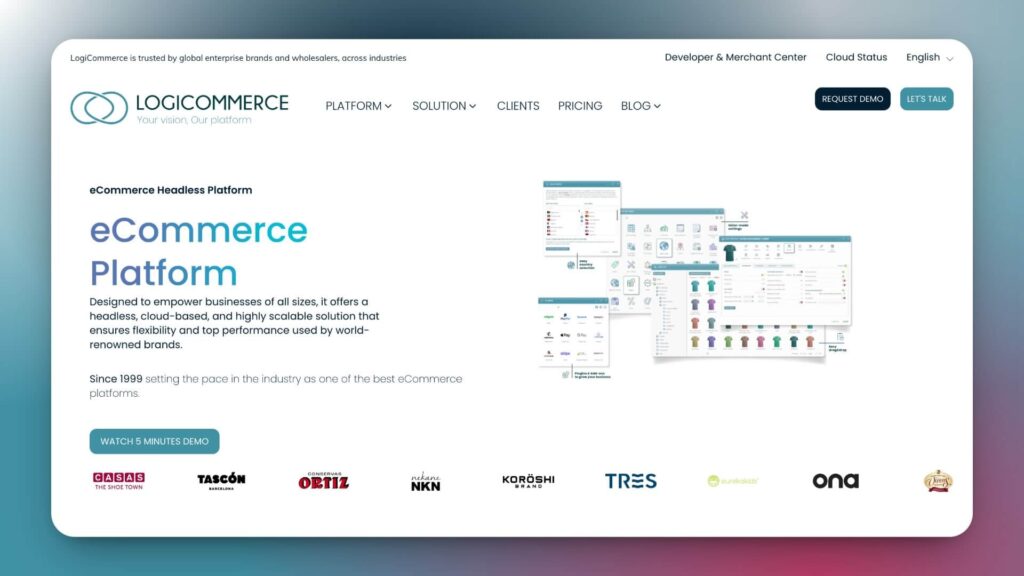
LogiCommerce is one of the most complete and affordable e-commerce platforms on the market. A SaaS solution with a headless architecture designed to adapt to the needs of growing companies and large corporations, both B2B and B2C.
One of the highlights of LogiCommerce is its intuitive and easy-to-use interface, which allows you to simplify everyday e-commerce tasks significantly with features such as drag-and-drop, Multi-window, and copy-and-paste.
LogiCommerce offers more than 200 B2B and B2C functionalities, including multi-policy pricing, sales agent management, catalogs tailored to user groups, multi-shipping, intelligent discount prediction, bulk buying, and SEO tools, among many others.
Brands such as Audi, EseOese, Eurekakids, GAP, and VW rely on LogiCommerce to grow their businesses efficiently and profitably.
Pros
Cons
LogiCommerce Pricing
LogiCommerce has a fully transparent pricing policy that helps keep technical debt to a minimum and TCO under control. All prices are published on its website.
It offers two different plans tailored to the needs and requirements of each business, with the Growth Plan priced at 39€ per month, offering no limit on annual sales.
7. Ecwid
Best online store builder for beginners
Ecwid is presented as a platform to create your online store, even if you already have an existing website. The ease of use and low cost make it an alternative to Shopify.
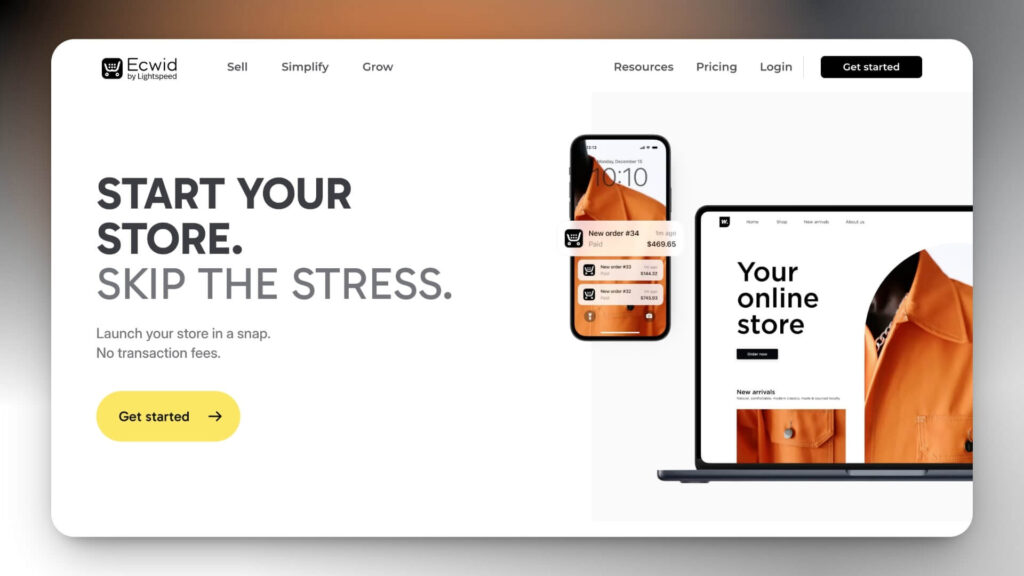
You can start selling and set up your account for free with no credit card required. Ecwid does not charge transaction fees and offers more than 70 eCommerce payment gateways worldwide, including PayPal and Stripe.
Additionally, with Ecwid, you can sell your products on Instagram, Facebook, Pinterest, TikTok, as well as Google Shopping and Amazon. You can also find a marketplace of the most popular applications, tools, and extensions to help grow your online store, although the selection is limited.
As we said at the beginning, Ecwid allows you to add your online store to several CMS, such as WordPress, Wix, or Squarespace, turning your website into an online store.
It is a worthwhile option for small businesses, particularly for brands that manufacture and sell their products directly to consumers. For Dropshipping or B2B businesses, we recommend other e-commerce platforms, such as Shopify or WooCommerce, which offer more integrations and e-commerce tools.
Pros
Cons
Ecwid Pricing
For those interested in creating a free online store, with Ecwid, you can start for free with up to 5 products.
- Ecwid Venture Plan: $25/month (Up to 100 products).
- Ecwid Business Plan: $45/month (Up to 2500 products).
- Ecwid Unlimited Plan: $105/month (unlimited number of products).
Read our Ecwid review (what it is, what it is used for, and prices).
8. Squarespace Commerce
Drag & drop e-commerce platform
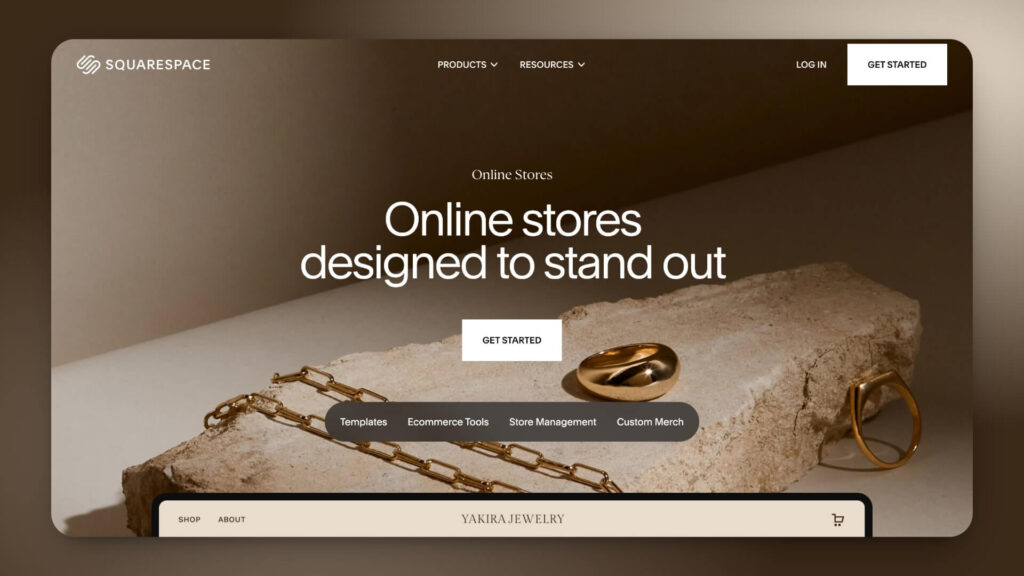
Squarespace offers all the features a small online store needs. The plan to create your online store provides payment options, customer tracking, gift cards, and much more. Other web builders would require plugins to do all that.
Unlike other Squarespace alternatives like Shopify or Ecwid, Squarespace is not only aimed at online store owners; you can also use it for blogs, portfolios, and corporate websites.
The most significant advantage Squarespace offers is its drag-and-drop theme editor, which allows you to customize your theme much more easily than on other e-commerce platforms. Customizing themes is easy and intuitive.
Squarespace is best suited for entrepreneurs and small business owners with basic online selling needs. If you require more advanced online sales capabilities or inventory management, you’d be better off with a more dedicated e-commerce platform, such as Shopify.
Pros
Cons
Squarespace Pricing
The Squarespace plans are divided into four options designed to suit different needs, from simple websites to advanced online stores.
- Personal ($16/month).
- Business ($23/month).
- Commerce ($28/month).
- Advanced Commerce ($52/month).
You can save up to 36% by opting for an annual payment. The Personal plan does not include e-commerce features.
9. PrestaShop
Best open source eCommerce platform
Founded in 2007, PrestaShop is an open-source e-commerce platform that offers the best overall value. It has more than 300,000 active users, and although it is not among the most popular in the world, PrestaShop is in the top 3 eCommerce solutions in Spain.
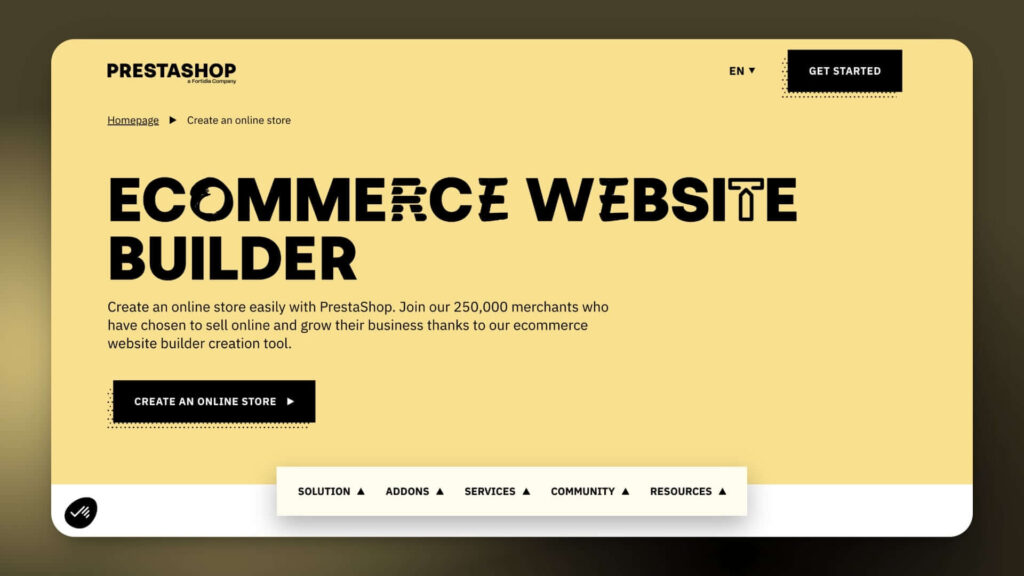
Pros
Cons
PrestaShop Pricing
PrestaShop is 100% free—no monthly payments or commissions on sales. However, the cost of hosting, SSL certificates, templates, plugin updates, and licenses can increase the price to what eCommerce platforms like Shopify can cost, saving you on technical troubleshooting and maintenance.
How to choose the best eCommerce platform
Let’s take a quick look at the essential elements when choosing the best eCommerce platform for your project or business idea.
- Pricing: Features and plans are different between E-commerce platforms. The size of your business and future expectations are essential to finding a long-term, scalable solution.
- Ease of use: Each ecommerce platform is aimed at a different audience (beginners, web developers). Consider what type of platform you need, your budget, and the technical skills you have or are willing to acquire.
- Inventory: Managing a store is hard enough as it is. It will be easier if you can create and manage products efficiently.
- Store management: You can’t run a store efficiently or effectively if you can’t manage it properly. This element includes order data, sales, and other reporting functions, as well as analytics.
- Technical support: This is an essential factor if you lack experience in web design and online store management. Opt for platforms that offer technical support and, if possible, in Spanish.
- Scalable: Some platforms are all-inclusive (software as a service), while others are open source. Each store is unique and will require different functionality than the others. You must consider that it is scalable over time.
E-commerce platforms for beginners
If you need a small online store, you can choose platforms such as Wix eCommerce or Squarespace, which are more than enough to handle the volume and online sales. They offer the most popular payment options.
But if you’re planning to create your most versatile online store, you’ll want to check out Shopify. This platform is better equipped to handle larger product inventories. In just a few minutes, you can have your online store, web design, and online sales set up.
If you are genuinely committed to your business and require a proven platform, then WooCommerce is your best option. It has more than enough plugins to help you launch a site that rivals the best e-commerce sites in your category.
B2B e-commerce platforms
If, in addition to selling directly to the end customer, you distribute through retail stores, it is essential to choose a platform that includes native features specifically designed for B2B businesses.
Among the B2B platforms for e-commerce, Shopify Plus, LogiCommerce, BigCommerce, and PrestaShop each have a different approach, yet maintain excellent security and user experience.
Frequently Asked Questions
In this section, we answer some frequently asked questions about eCommerce platforms.
What is an eCommerce platform?
An eCommerce platform is a software application that allows you to sell your products and services online, manage your catalog, sales, marketing, and operations. It handles tracking orders, processing payments, handling returns, and facilitating exchanges. It also provides reports and analytics about your store.
What is the best Ecommerce platform for beginners?
Below you can see the best eCommerce platforms for small businesses and beginners:
Shopify.
WooCommerce.
Wix eCommerce.
LogiCommerce.
Squarespace.
Ecwid.
What is the best Ecommerce platform for large companies?
Below you can see the best eCommerce platforms for small businesses and beginners:
Shopify Plus.
Magento eCommerce.
LogiCommerce.
BigCommerce.
PrestaShop.
Conclusion
Nowadays, there are numerous eCommerce platforms and online store builders to choose from, which is beneficial, each with its advantages and disadvantages. Ensure you select an online retail platform that can meet all your needs and is tailored to your niche. Ensure they have templates that align with your brand.
If the E-commerce platform has a free trial option, try it out. This will enable you to determine if it aligns with your business model. Make sure it is easy to use before signing up for a monthly or annual plan.
Of all the Ecommerce platforms we have discussed, Shopify is simply one of the best. If you want to learn more about what Shopify has to offer, go check out all of the Shopify templates available.
Notice: Impulsa eCommerce is supported by readers. If you purchase through a link on our site, we may earn a commission at no cost to you. See more.

